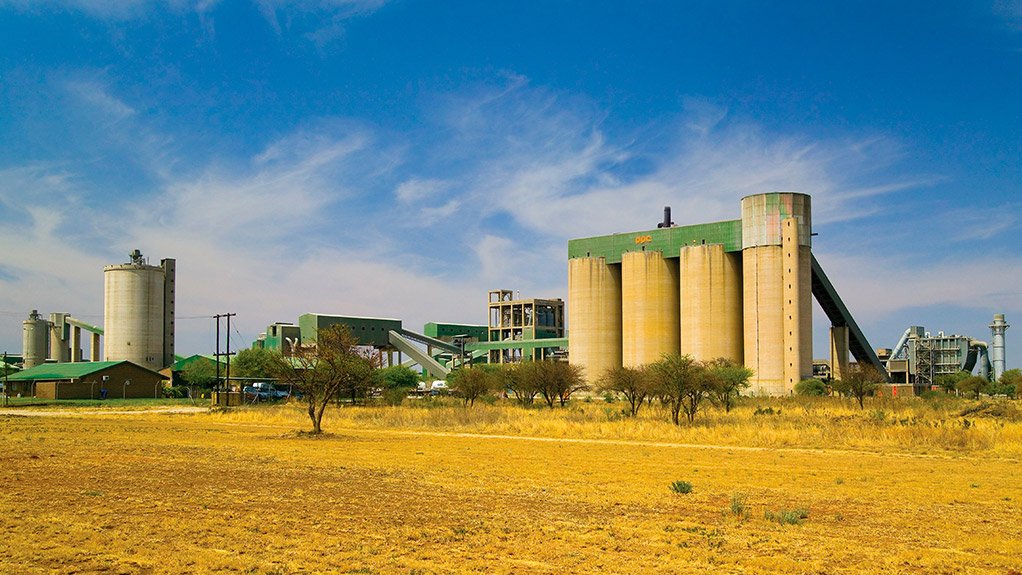JSE-listed PPC has posted flat earnings before interest, taxes, depreciation and amortisation (Ebitda) of R1.14-billion for the six months ended September 30, while its Ebitda margin, at 22.2%, was negatively impacted on by selling price pressures and the timing of administration and other operating expenses.
The cement producer further noted that owing to higher finance costs and revaluation losses on the foreign currency monetary items, together with the nonrecurrence of the prior period's exceptional profit on the sale of noncore assets, net profit attributable to shareholders declined by 72% to R102-million.
In line with this, earnings a share were 76% lower year-on-year at 13c and headline earnings a share 66% lower year-on-year at 14c.
However, PPC’s revenue increased by 15% to R5.2-billion for the six months under review, up from the R4.6-billion reported in the first half of the prior financial year, as a result of higher group cement sales volumes, specifically in South Africa, where cement volumes were up 13%, and Rwanda, where volumes were up 19%.
Another major boost to the company’s balance sheet was the capital raise that was completed in September.
The company raised R4-billion through the placing of 920-million rights offer shares, significantly improving its debt position. CEO Darryll Castle told Engineering News Online that reducing the debt through the cash raising derisked the company.
“Our balance sheet, at the centre, is now lightly geared and this puts us in a position to withstand any future shocks that could happen. We don’t necessarily see those happening, but we certainly are in a position that we can withstand a lot more than we could before,” he explained.
The group’s Ebitda to sales ratio also reduced to 2.6 times from 3.8 times in the comparative period.
With regard to the company’s credit rating – in place because of its bond programme, which it had now substantially paid back – Castle hoped to see improvement in the new year. “There is still a small amount outstanding [in the bond programme],” Castle said.
He added that there was a need for a review of PPC’s credit rating, “definitely with the balance sheet being degeared and our projects all being delivered. The future cash flow of the company looks a lot stronger,” he stated, pointing out, however, that he could not talk on behalf of the credit ratings agencies.
Castle also noted that, compared with the previous assessment, when it seemed that PPC would not have the ability to raise capital and, therefore, be unable to repay debt to its current position, this change should bring about material changes in its credit rating.
POTENTIAL FOR GROWTH
Castle said that while the local construction industry was still experiencing low growth, “without any significant breaks into the upside”, the country’s infrastructure deficit still held potential.
“We believe government will use this fact to stimulate the economy, which would assist our industry,” he added.
PPC's overall cement sales volumes were 13% higher during the six months, reflecting the impact of double-digit volume growth in the coastal regions, as the Western and Eastern Cape continue to benefit from lower import activity coupled with sustained growth in local infrastructure projects.
“The Western Cape, economically, is doing better than average. The gross domestic product there is almost twice that of South Africa, which is leading to reasonable growth in cement volumes,” Castle stated.
Increased competitor activity has also affected the inland regions, in particular Gauteng, Mpumalanga and the North West. The Limpopo region, although under pressure, showed some resilience with positive volume growth supported by the launch of the P&L house brand which is produced by PPC.
South African sales volumes were up 7% year-on-year, while selling prices were 4% lower year-on-year. The cost of sales for the respective period was 3% higher than the prior period on a rand-per-tonne basis.
CONSOLIDATING INDUSTRY?
A question that remains regarding the oversaturated cement industry, in a low growth construction environment, is whether consolidation between the country’s cement producers would not improve margins.
This, Castle explained, was something that industry would “ultimately have to think about”, adding that anything that was positive for the industry, would be positive for PPC.
“As the largest cement producer in the country . . . we need to look at what our role should be in that equation, whether it is possible or positive,” he stated.
Castle further noted that the industry should not think that if consolidation occurred, the supply and demand balance and pricing power would “suddenly change”, as the Competition Commission would still protect the consumer against a “worse-off” position.
Edited by: Chanel de Bruyn
Creamer Media Senior Deputy Editor Online
EMAIL THIS ARTICLE SAVE THIS ARTICLE
To subscribe email subscriptions@creamermedia.co.za or click here
To advertise email advertising@creamermedia.co.za or click here













